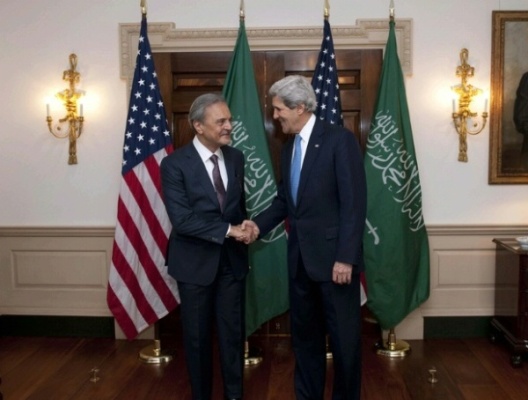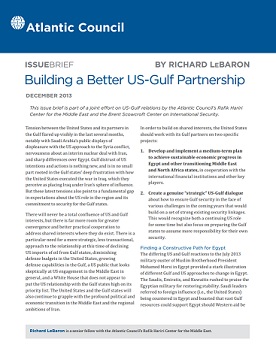 Saudi Prince Turki al-Faisal’s comments yesterday about US red lines on Syria and Iran becoming “pinkish as time grew,” and eventually ending up “completely white” indicate the extent of Gulf state exasperation with the Obama administration’s Middle East policies. More than anything, Gulf states are concerned that US President Barack Obama is not exerting US influence in a decisive, strategic fashion. Given the low point in US-Gulf relations, in large part because of concerns over the interim nuclear deal with Iran, ongoing policy differences over the “problem from hell” (Syria), and questions about US commitment to longstanding defense agreements, US-Gulf relations need reinvigoration and a frank reassessment by all sides. As former US ambassador to Kuwait Richard LeBaron argues in a new report, a genuine strategic US-Gulf dialogue is needed, not only to develop better coordination on policies towards the Arab transition countries, but also to rejuvenate the relationship with conversations about new types of partnerships not based solely on defense and security interests.
Saudi Prince Turki al-Faisal’s comments yesterday about US red lines on Syria and Iran becoming “pinkish as time grew,” and eventually ending up “completely white” indicate the extent of Gulf state exasperation with the Obama administration’s Middle East policies. More than anything, Gulf states are concerned that US President Barack Obama is not exerting US influence in a decisive, strategic fashion. Given the low point in US-Gulf relations, in large part because of concerns over the interim nuclear deal with Iran, ongoing policy differences over the “problem from hell” (Syria), and questions about US commitment to longstanding defense agreements, US-Gulf relations need reinvigoration and a frank reassessment by all sides. As former US ambassador to Kuwait Richard LeBaron argues in a new report, a genuine strategic US-Gulf dialogue is needed, not only to develop better coordination on policies towards the Arab transition countries, but also to rejuvenate the relationship with conversations about new types of partnerships not based solely on defense and security interests.
 For more on the reassessment of US-Gulf relations, read Ambassador Richard LeBaron’s latest issue brief, Building a Better US-Gulf Partnership. Click here to download the brief. |
Despite the prudent recommendation, critics identify a number of factors that could impede progress on this type of open, sustained dialogue. Syria is perhaps the biggest area of divergence between Gulf states and the United States. In fact, anger at the United States for refusing to take a more active role in the Syria conflict by conducting military strikes or arming rebels on a larger scale infuriated Saudi Arabian leaders to the point that they recently rejected an appointment to the rotating UN Security Council seat. Clearly, the catastrophe in Syria colors major Saudi foreign policy decisions, particularly with regard to the United States. Given the Obama administration’s obvious distaste for involvement in Syria (and indeed the Middle East at large), this may impair a genuine US-Gulf dialogue in the near term.
Gulf concerns about the recent nuclear deal with Iran are another source of enmity and anxiety. It seems that no matter how often US presidents and military officials affirm the commitment to Gulf security, conspiracy theories abound about US intentions to draw close to Iran and pull away from the Gulf states. Perhaps it is time for a different model, one that diversifies US-Gulf interests away from what is often a highly transactional security/military relationship. This shift would take time to build, but it would be more fruitful in the long run. The reality is that the United States is increasingly less reliant on Gulf oil and changing flows of people and ideas create new arenas for partnership. For example, over 100,000 Saudi young people are studying in the United States on the King Abdullah scholarship program. Taking advantage of this opportunity could be an area of new higher education and business cooperation if developed to its full potential.
More coordination with the Gulf states on policies towards the Arab transition states in the short- and medium-term is possible and would benefit all parties. In particular, Gulf states want to see a stable, economically viable Egypt, and so does the United States. Despite the significant differences on how best to achieve these goals, this shared interest would be a good place to start, particularly since Gulf leaders recognize the unsustainability of billions in cash transfers to Egypt.
At this juncture in US-Gulf relations, the time is ripe for a reassessment of the very foundations of relationship. Security interests will naturally remain a priority for all parties, but it is time to reassess the long-term value of such a narrow partnership with some of the wealthiest countries in the world who will continue to play a leading role in the Middle East. Rather than standing by and letting the relationships continue to fray, the United States should proactively work with the Gulf states, even if they are unwilling and suspicious at the outset, to begin a serious and honest conversation about how to broaden and deepen the partnership over the long-term.
Stefanie Hausheer is an assistant director with the Rafik Hariri Center for the Middle East.
Image: US Secretary John Kerry holds a bilateral meeting with Foreign Minister of Saudi Arabia, Saud al-Faisal, at the Department of State, April 2013. (Photo: US Department of State)
